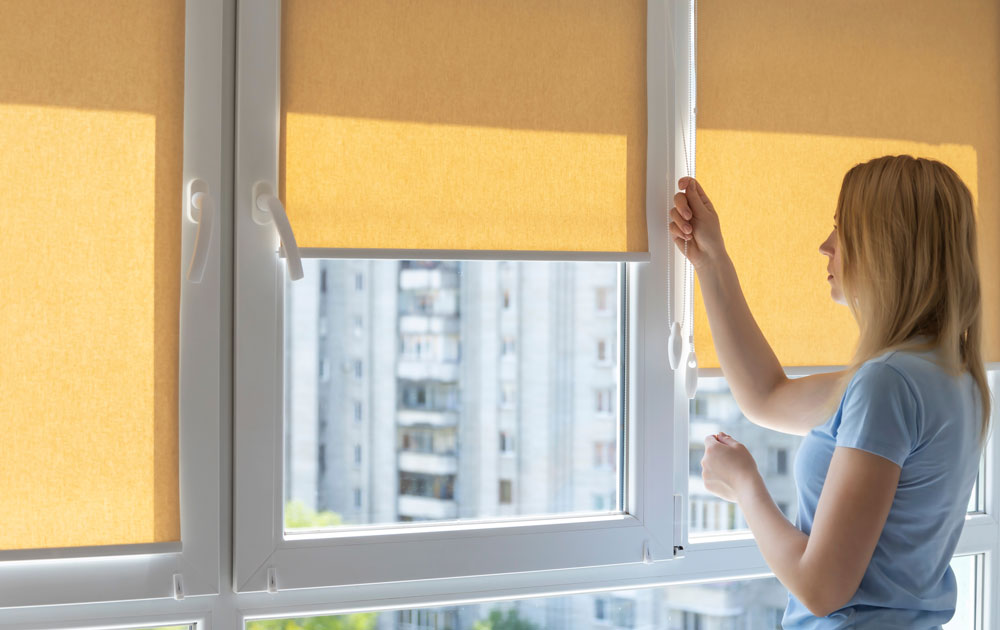How To Clean Mould Off Roller Blinds
 CONTENTS
CONTENTS
- What causes mould on roller blinds?
- Is mould dangerous?
- How to remove mould from roller blinds
- How to prevent mould on roller blinds
- Get in touch
One of the most common places for mould growth to hide is on roller blinds. It is crucial you have it removed as soon as you spot it growing to minimise the damage it can cause in your home and protect your health.
Here at ICE Cleaning, we offer our mould remediation services nationwide. Our Dewpoint-accredited technicians have many years of experience cleaning mould off of hard surfaces and in the air, and can quickly make your home a safe, clean space.
Keep reading to learn more about what causes mould to grow on roller blinds and how to remove it from them.
What causes mould on roller blinds?
Mould is a type of fungus that flourishes in damp settings that contain organic material and oxygen. It is usually caused by high humidity, poor ventilation, and condensation. It is often found in the bathroom and kitchen due to their humid conditions, and around windows due to the presence of condensation.
Blinds and curtains are vulnerable to mould growth as they can get damp from the condensation which can lead to mould growth, or mould growing on the window can spread to them. As blinds and curtains are usually made from organic material, mould can thrive on them and grow quickly.
Roller blinds are particularly at risk as they tend to trap humid air against the cold glass, increasing the chances of condensation forming. Since they are often made of fabrics that absorb moisture easily, they can retain dampness.
Is mould dangerous?
Mould is more than just an unsightly nuisance; it poses real health risks. Mould can release allergens, irritants, and toxic substances and is associated with a range of serious health problems including respiratory infections and sick building syndrome.
For individuals with asthma or immune conditions, the presence of mould can exacerbate their symptoms significantly. Young children and elderly people are also very vulnerable to exposure and can have more severe reactions.
If you have spotted black mould on your roller blinds, you might assume toxic mould is growing in your home. But only certain kinds of black mould, like Stachybotrys chartarum, produce (toxic substances). Nevertheless, to protect your health, it is best to have any mould you see in your property removed immediately.
Mould can damage the surfaces it grows on, as well. Organic materials like fabric and wood can become stained and begin to deteriorate. Should mould start to grow on building materials, it can affect the structural integrity of the property, too.
How to remove mould from roller blinds
Many recommend scrubbing at mould patches with harsh chemicals like bleach or hydrogen peroxide. However, without the right techniques and safety measures, removing the mould from your blinds can disturb spores, causing them to become airborne. This can put you at risk of inhaling them and may cause mould to grow elsewhere.
Additionally, household cleaning agents often fail to kill mould effectively, particularly mould that is growing deep in the pores of soft surfaces, like fabric. Any mould that is not killed will simply grow back. Abrasive removal methods can even damage the surface you are trying to clean, making the situation worse.
Instead, bring in mould remediation specialists who will have the specialist equipment and personal protective equipment to safely and thorough eliminate all the mould in your home. They will even be able to kill mould spores in the air. Specialists can diagnose the specific cause of the mould growth in your home, too, so you can put in place effective preventative measures.
You can learn more about how to remove mould from fabric blinds here.
How to prevent mould on roller blinds
Mould thrives in damp and poorly ventilated areas, making roller blinds a potential hotspot if not maintained properly. To keep that pesky mould at bay, think about adopting strategies to lower humidity and boost air movement near your window dressings.
Improving air circulation can significantly deter mould growth on roller blinds. Regularly opening windows or using extractor fans helps remove moist air from inside the home. During colder months, when opening windows might not be feasible, a dehumidifier can assist in maintaining lower humidity levels indoors.
Incorporating vents or air bricks into rooms prone to high humidity also provides a more permanent solution for enhancing ventilation. This ensures continuous airflow.
Roller blinds made of fabric are particularly susceptible to mould due to their ability to absorb moisture. Opting for mould-resistant roller blinds, or blinds made of materials like PVC or polyester which are moisture-resistant, can help prevent mould formation.
You should consider alternative types of blinds that allow better airflow, too, such as venetian blinds. The slats facilitate air movement across the window surface, reducing condensation build-up.
Sometimes it is our daily activities that contribute most significantly to indoor humidity levels like cooking without lids on pots or drying clothes indoors. To counteract these effects, ensure kitchen extractor fans are used during cooking and, whenever possible, dry laundry outside or in well-ventilated areas.
Do not forget to regularly clean your roller blinds, too. This will remove a build up of dust and dirt that mould can feed off of and will help you find mould growth before it becomes a major problem.
Get in touch
Did you know we offer a lifetime guarantee* with every mould removal? That means in the unlikely event the mould returns after treatment, our technicians will return to site to remove it for free.
To book your mould removal, call our team on 0208 066 0360 or email enquiries@icecleaning.co.uk. They will be happy to schedule your free site survey and provide you with a no-obligation quote.
*subject to advisories

Speak with me today,
I’m here to help
By asking you a few questions either via phone or email I can immediately provide a realistic estimation of the cost.

Why choose us?
- Cater to a wide variety of cleaning situations
- Nationwide coverage, available 24/7
- Cater to commercial and domestic clients
- Free survey provided prior to quotation
- Emergency response team
- Offer a bespoke service designed to suit all your needs
- All technicians hold professional health and safety qualifications, including BICSc, IOSH, Dewpoint Professional & Safe Contractor
We’re fully accredited
We place best practise, professional expertise and health and safety at the core of our business. We’re fully compliant with all legal obligations. You can view a list of our accreditations below, or visit our Health & Safety page for more information.











-RGB-small.1707319151.jpg)




















